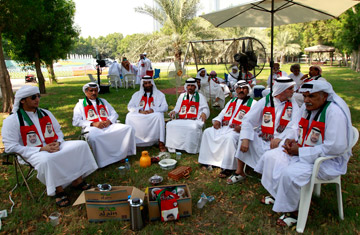
Government supporters gather outside a court hearing for five U.A.E. activists charged with insulting the Gulf country's leadership, in Abu Dhabi on Oct. 2, 2011
(2 of 2)
Four of the five defendants walked out of their fourth and fifth court appearances, the activists told TIME, to protest being denied the right to review the evidence and charges against them, and against their defense lawyers being forbidden from cross-examining some prosecution witnesses. The Emirati activists face up to five years in prison if convicted, with no right of appeal.
The case resumed again on Sunday, but once again, most of the activists refused to appear before the court. The case "is merely a farce and facade, meant to legitimize and make credible verdicts and penalties that may have already been decided," bin Ghaith wrote in a statement leaked to human-rights groups earlier this month from al-Wathba prison where the five are detained. "I refuse to play the role written for me or to participate in this trial that does not rise to the standards of a fair trial," he said, explaining the boycott.
The families of the five defendants issued a letter to the country's rulers on Sunday asking them to release the activists, saying the five had been held in conditions worse than those for convicted felons, including extended stints in solitary confinement. They have been deprived of natural light, recreation time and exercise, the letter reads, in addition to being subjected to a campaign of intimidation by inmates, including death threats. The next hearing is on Oct. 23.
"If there wasn't discontent, [the government] wouldn't try to make such an example out of the five," says HRW's Samer Muscati. "It's not enough just to have a nice villa, I think people want to be engaged in the political process."
It's not that the government fears social change, counters a prominent social activist who prefers to remain anonymous, so much as the pace of change and how it is obtained. The detained activists went about it the wrong way, he argues. "We are a small, very traditional, tribal society," he says. "You can't just publicly force the rulers to change or else. They didn't give the rulers time in private to respond to their demands. They immediately made them public, which insulted the leaders ... They didn't show respect, or remember the culture they were operating in."
Hadroom, the candidate from Ras al-Khaimah, concurs. An outspoken, successful and cosmopolitan businesswoman, she says the U.A.E. must and will change, but that the change can't be sudden "unless you make a big mess." Hadroom's platform included improving infrastructure in her native emirate as well as expanding the powers of the FNC, including granting it legislative authority — not unlike the demands of the petition. But, she says, she approached the issue in a "respectful" way. "Not everybody is as open-minded," she says. "Most people believe in tradition, and that's their right. You cannot just change them suddenly and their views of how you approach authority." The FNC elections weren't a perfect experiment in democracy, she says, but they were a promising start.
Sulaiman al-Hattlan, chief executive of the Arab Strategy Forum in Dubai, says Gulf rulers have less to fear from their people than other Arab autocrats and should consider that an opportunity. "There is no major challenge to the political legitimacy of royal families in the region," he says, with the exception of Bahrain — where a Sunni royal family holds sway uncomfortably over a majority Shi'ite population. Most Gulf rulers should embrace change, he adds, "today, before it becomes more complicated tomorrow."
Abu Dhabi and Dubai may have shot out of the sands in a few short decades, but changes to society and polity are clearly a trickier, longer proposition. Political reform "has to do with the development of the people themselves, their political awareness," says al-Ketbi, the political scientist. "You cannot just jump into this Arab tide [of change]. People here, given the right to vote, didn't go. You can't just create it artificially, it will come naturally."
